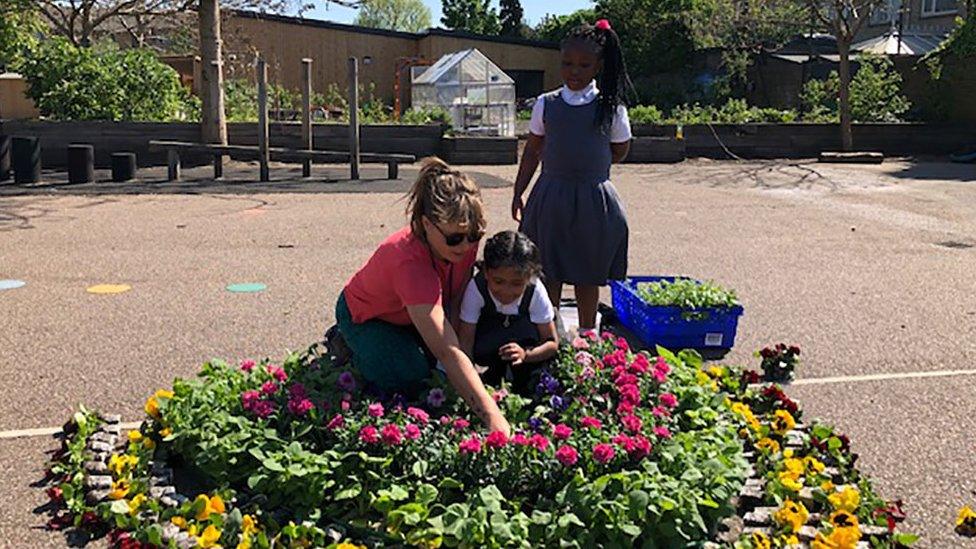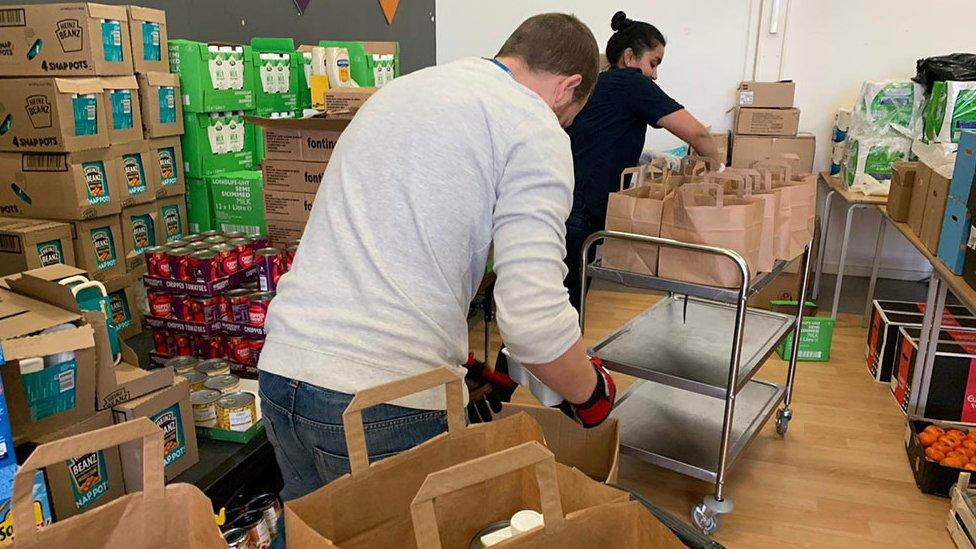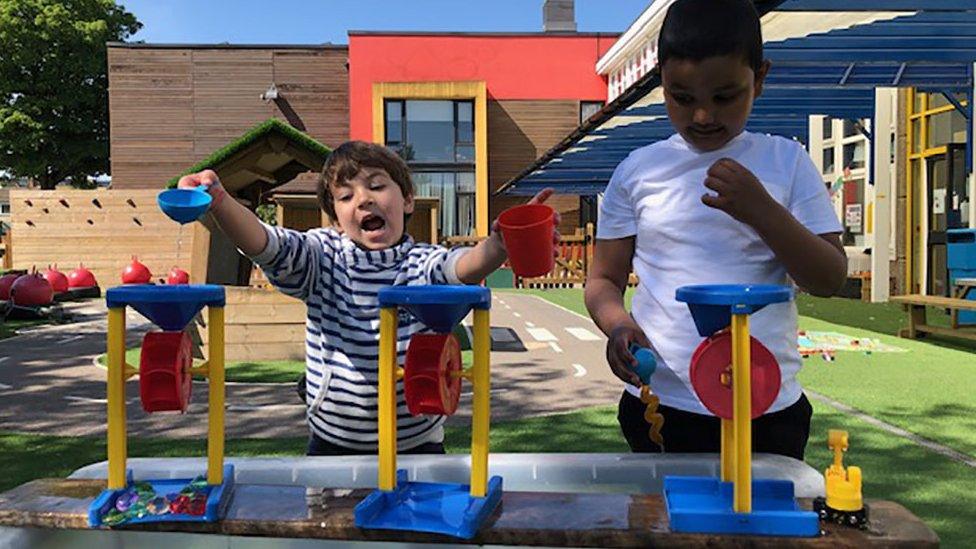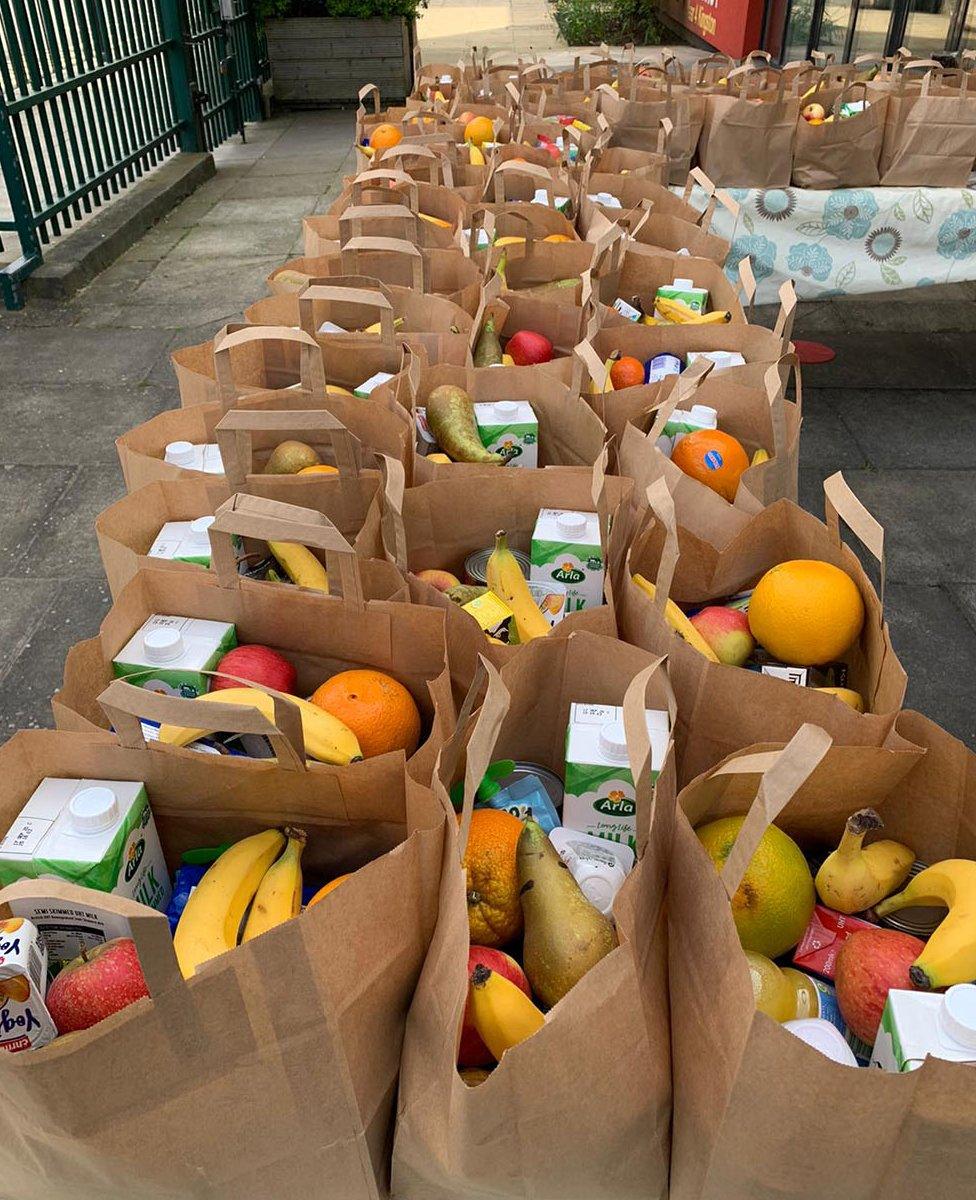Tiny fraction of 'at risk' children attending schools
- Published

Manorfield Primary staff are also supporting the children of key workers
Only a tiny fraction of vulnerable children in England are taking up the emergency school places kept open for them, official figures show.
This has prompted concerns "at risk" children are facing increased danger in the lockdown, while schools and teachers struggle to get hold of them.
New data shows only a maximum of 5% of the most needy children have been at school during the Coronavirus crisis.
The Children's Commissioner says social workers should be "knocking on doors".
The Department for Education data shows just 29,000 so-called vulnerable children attended school in the week before the Easter holidays.
This includes a group of children with greater levels of special educational needs - but many of this larger group may be staying at home with their families for a range of legitimate reasons.
However, more than 723,000 children were known to children's social care services in 2019.
The figures were described as "utterly shocking" by the Liberal Democrats.
But children's minister Vicky Ford said children who were not in school were being monitored by social workers and supported in other ways.
'Substance abuse'
Anne Longfield England's Children's Commissioner told the BBC: "What we now know is, what we've been hearing over the last few weeks, that the vast majority of vulnerable children in this country are not attending, despite the fact that schools are open.
"What that means is that they are at home, potentially with a cocktail of risks.
"They may be in homes with quite fragile environments, potentially domestic violence in the home - which we know is increasing, parents with drug and alcohol addictions or indeed severe mental health conditions.
"So often these children are quite invisible at home and not in the place which is best at keeping them safe - school."
Ms Longfield said referrals to social services had dropped by half, and she expressed concerns that bored, vulnerable teenagers could be leaving their homes and getting into situations where they would be exploited and groomed by criminals.
She called for a clearer message from government, adding that "social workers need to be knocking on doors and everyone needs to be working tirelessly to get these vulnerable children into schools".
Manorfield Primary School, external in Poplar, east London, has a high percentage of vulnerable children - 72 of the 736 children on its rolls are deemed to be 'at risk'.
But only a tiny small fraction of these are coming to the school, which has joined up with 10 local primaries to provide a hub for vulnerable children and those of key workers.

Staff pack food parcels for their community
Staff have been phoning their most vulnerable families every other day to check how they are.
Head teacher Paul Jackson said: "I've had a senior teacher calling the families of children at risk.
"If they can't raise anyone, we trawl through the emails. If that doesn't work, we are carrying out home visits.
"We are trying every means to contact them, and working through the process to refer those we can't get hold of on to social services to see if they're safe."
Mr Jackson adds: "When we are in normal operational times, we have concerns about children who go missing, children who may face sexual exploitation, children who are getting into criminality, as well as children who may not get enough to eat.
"These concerns are still here at this time, if anything they are exaggerated by the situation."

Manorfield Primary is also providing fun activities for the children of key workers
These are children of families where there is known to be domestic violence, substance abuse, parental sickness or disability, as well as poverty - which is closely associated with neglect.
And if the children are not attending, it is very difficult for the school to know where they are and how they are.
Because of the high level of need, the school employs its own social worker, Nessa Young.
'Sleepless nights'
She says: "It's hard because we are trying to support them but we are restricted by what we can do from afar.
"It's about making an extra phone call to see if there's anything we can do. But we can't see who may be standing next to the phone.
"We are doing everything we can but there have been a few sleepless nights," she says.
"There is always that nagging feeling: 'Is there something else I can do?' And: 'How can I do it with all these restrictions in place?'"
On top of its concerns for children's safety, the school has mounted a massive effort to ensure its community has enough to eat, after numerous families got in touch to say they had run out of money.
Its operation to deliver food parcels to 300 struggling families in east London resembles that of a humanitarian aid charity in a warzone.

Manorfield Primary is raising funds to keep the food parcels coming to needy families
Teachers and school staff are bagging up fresh fruit, vegetables and other essentials, to deliver to needy families.
The school has been topping up the money it gets for free school meals to buy produce for families who find themselves incapacitated by the epidemic.
It has set up a fundraising campaign, external to keep this huge effort going, as the school feels what is being offered by the government is not enough for its needy families.
Education Secretary Gavin Williamson said his first priority was protecting the well-being of children and young people but particularly those vulnerable young people with social worker or special educational needs.
"Schools are open for them and we're working to make sure those who should attend do so."